

'Essex girl' removed from dictionary following campaign. The expression “Essex girl” has been removed from a dictionary used to teach English after a campaign by women from the county who described the term as offensive.
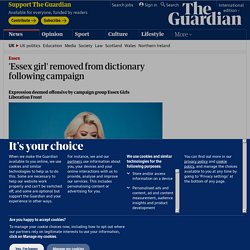
According to the Oxford University Press, “Essex girl” was previously defined as “a name used especially in jokes to refer to a type of young woman who is not intelligent, dresses badly, talks in a loud and ugly way and is very willing to have sex.” It has now been removed from the Oxford Advanced Learner’s Dictionary, used to teach non-native English speakers, after a campaign group called the Essex Girls Liberation Front said using the expression was “very offensive”. The phrase will still be included in the Oxford English Dictionary (OED) because its publishers claim it is a “historical dictionary”, in which nothing is ever taken out. The campaign was instigated by the author Syd Moore, who referenced “Essex girl” at an International Women’s Day conference. On hearing the news, she tweeted: Oxford Dictionaries amends 'sexist' definitions of the word 'woman'
Oxford University Press has updated its dictionaries’ definitions of the word “woman” following an extensive review triggered by equality campaigners.
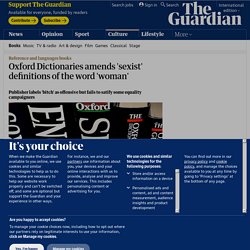
Among the updates to Oxford Dictionaries’ definitions is the acknowledgement that a woman can be “a person’s wife, girlfriend, or female lover”, rather than only a man’s. The entry for “man” has also been amended to include the same gender-neutral terminology, while many other terms relating to sexual attractiveness and activity have been revised. Fresh call for Oxford dictionaries to change 'sexist' definitions.
The leaders of Women’s Aid and the Women’s Equality party are among the signatories to an open letter calling on Oxford University Press to change its dictionaries’ “sexist” definitions of the word “woman”.
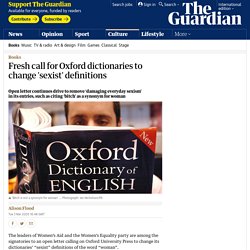
The letter points out that some Oxford Dictionaries’ definitions of the word include synonyms such as “bitch” and “maid”, and says that derogatory and sexist examples of usage include, “God, woman. Will you just listen?” Culture. Allow me to womansplain the problem with gendered language. She is a #Girlboss.
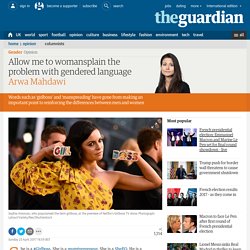
She is a mumtrepreneur. She is a SheEO. He is a manterrupter. A mansplainer. A manspreader. Much of this is feminism’s fault, naturally. Neologisms such as girlboss and SheEO are supposed to be tongue-in-cheek, of course. The same is true of the manifold vocabulary for manshaming. Language reflects and reinforces social norms; ungendering language is an important part of solving sexism. Earlier this year, Kosztovics called for the UK to follow Sweden’s lead in a video on the BBC. Perhaps the most success around fixing semantic sexism has been had by the increase of “they” being used as a singular pronoun. We are more aware of the problems of gendered language than ever and, as the use of the singular they demonstrates, we are taking steps to fix it. Feisty, flounce and bossy: the words used to put women down. Feisty “Feisty?
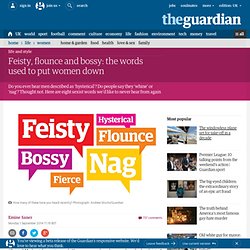
My least favourite word. Have you ever heard a man described as feisty,” said Daisy Lewis, who plays the schoolteacher Sarah Bunting in Downton Abbey, in an interview . “Have you heard a male character described as feisty? I think not.” Fierce Another of those words that sounds good, but when you think a little harder you can see it’s problematic. In a fantastic blogpost this February, Bridget Minamore wrote: “The synonyms of ‘fierce’ are violent, ferocious, brutal, severe, stern, angry, vicious, furious, intense and strong. Bossy As the Ban Bossy campaign puts it: “When a little boy asserts himself, he’s called a ‘leader’. Flounce A word so feminine it conjures up lace petticoats. Nag Spotting the potential of the men-with-nagging-female-partners market high-street chain River Island started selling “nag gags” earlier this year – essentially, football-shaped gimp gags. Whine Often used to describe dogs. Hysterical ‘Mother of …’ Ban Bossy. Encourage Girls to Lead.
This video hilariously disproves all the arguments people have against gender neutral language. They’re becoming more and more common, but some people still feel uncomfortable about the use of gender neutral pronouns.
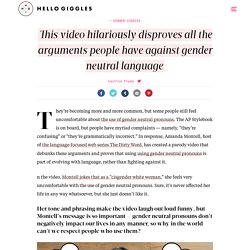
The AP Stylebook is on board, but people have myriad complaints — namely, “they’re confusing” or “they’re grammatically incorrect.” In response, Amanda Montell, host of the language-focused web series The Dirty Word, has created a parody video that debunks these arguments and proves that using using gender neutral pronouns is part of evolving with language, rather than fighting against it. n the video, Montell jokes that as a “cisgender white woman,” she feels very uncomfortable with the use of gender neutral pronouns. Sure, it’s never affected her life in any way whatsoever, but she just doesn’t like it. “‘They’ is grammatically incorrect,” she emphatically states. She has some very valid concerns — is she supposed to say “they is going to be late for brunch?” Ladies And Gentlemen, Our Language Is Too Gendered.